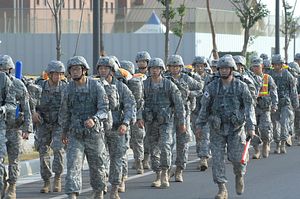Once boasting one of the youngest populations among OECD countries, current projections suggest that the Republic of Korea (ROK) will be among the oldest within the century. In light of this daunting demographic hurdle, the ROK must look to a future where, in place of people, it will need to turn to technology to sustain its national security.
Considerable work and discussion in recent years have been devoted to the effects of an aging population in Northeast Asia, particularly the ROK. Given the statistical projections, this is unsurprising. According to the Korean Statistical Information Service (KOSIS), in 2050, 36 to 39 percent of South Koreans will be 65 or older. This scenario produces a set of circumstances that will challenge the status quo. As shown by a Center for Strategic and International Studies (CSIS) report on the issue, an aging population will not only acutely effect economic output in the ROK, but also create social disruptions due to pressure on societal norms, particularly the treatment of the elderly and gender equality. Perhaps even more interesting, however, is the looming impact on national security given the importance of conscription to the ROK Armed Forces.
Based again on KOSIS data, in 2013, the male population between the ages of 15 and 45 was approximately 11.4 million. In 2050, this number is projected to be 5.2 million. While conscription has emerged as a contentious issue in the ROK in recent years, its insistence on keeping the institution is easier to understand when contemplating the U.S. Department of Defense estimate that 4 to 5 percent of North Korea’s 24 million people are serving on active duty. Yet with a loss of more than 50 percent of males of military age projected in less than four decades, questions are likely to be raised over the long term sustainability of this strategy.
In Technology We Trust
The coming demographics challenge in the ROK very likely means a future with a leaner military. In the absence of dramatic steps to stimulate population growth over the next decade, the ROK will be confronted by the major strategic challenge of compensating for a military manpower decline in an uncertain world. Fortunately, it may have an answer in technology. Today, the development of new systems has opened the door to a future in which a loss in manpower can potentially be offset. New assets produced in the U.S. such as the Zumwalt-Class Destroyer, which allows for a smaller crew with advanced automated systems, as well as the carrier-tested X-47B Unmanned Combat Air Vehicle are but a few of the developments that have particular resonance for the ROK, given its demographics and global reputation for its cutting-edge technology—a unique position as a country with both the “means” and “need.”
But acquiring the technology is perhaps the easier part; coming to terms with what it actually represents may prove more challenging. The greatest test for the ROK in the coming decades, if technology is the route forward, is confronting the psychological significance of treating hardware and software as more than just an augmentation of military power. Rather, it will need to be seen as military power in the face of shrinking numbers of military personnel. Daunting as that sounds, accepting the place of autonomous, unmanned and cyber assets as the coming norm could reenergize conceptual and institutional frameworks, bringing fresh perspective to not only conflict modeling and battlespace management but also joint operations with key allies. Some U.S. experts foresee a coming “military-technical revolution,” in which the confluence of new technologies and the resultant new concepts and organizational frameworks converge to dramatically improve military effectiveness. The ROK could be at the cutting edge of this revolution, if it so chooses.
Andrew Kwon is a Master of International Security graduate from the University of Sydney

































